Otura Niko (Otura Ogbe): Meaning, Tips and Analysis of this Ifa Sign

Otura Niko is the Odu of Ifa # 197 of the Genealogical Order of Ifá, it is the combination between the older Odu Otura and Ogbe. This sign is the foreman of the eggun, which is why it is written on the tile when they are going to be sacrificed. Wisdom is the most refined beauty of the Babalawo.
Analysis and Interpretation of the sign Otura Niko (Otura Ogbe)
Otura Niko represents the intersection between life and death, highlighting the birth of such crucial phenomena as the agitation of the sea, corn, and the nervous system in the organism. It is an odu that emphasizes the need to be prepared, the power of evil even among those of light, and the importance of communication with the afterlife. This sign teaches prudence, preparation, and generosity as keys to spiritual and material enrichment and evolution.
Economic Aspects
From an economic perspective, Otura Niko suggests a period of evolution and potential growth for those who follow his teachings. Generosity and preparedness are recurring themes, indicating that by giving generously and being prepared for opportunities, one can ensure Ire (blessing) in their endeavors. The story of Oshun hiding money and Shango hiding treasures under the star apple tree symbolizes the need to be astute and aware of where and how to store our resources.
"Salud"
In terms of health, Otura Niko warns about possible conditions related to the throat, spine, and nervous system, as well as blood pressure. This odu advises caution against the excesses that can lead to such conditions. The prohibition of consuming certain foods and the recommendation of specific rituals such as baths with certain herbs point out the importance of purification and personal care to avoid illness.
Religious Aspects
Religiously, Otura Niko (Otura Ogbe) is deep and complex. It highlights communication with ancestors and spiritualism as crucial aspects, reflecting the importance of respect and veneration for the dead. The reception of Oduduwa and other deities underlines the need to strengthen spiritual bonds and ensure divine protection and guidance. The story of Shango stealing a sacred object from Olofin and the recommendations for specific sacrifices and offerings illustrate the need for righteousness, respect, and devotion in religious practice.
Personal Relationships (Love)
In the area of love and personal relationships, Otura Niko speaks of loneliness and boredom but also of the possibility of transcending these conditions through obedience and kindness. The loneliness mentioned in this odu is not a fixed destiny, but a reminder of the importance of cultivating meaningful relationships and maintaining loyalty and respect towards loved ones. The stories of human disfigurement at death and the cry of the child in the womb highlight transformation and empathy as fundamental values in dealing with others. However, this odu also manifests great difficulty when developing love relationships, being a sign associated with deception and betrayal. This underscores the importance of being extremely cautious and cautious when choosing a partner, warning of the need for discernment and wisdom in matters of the heart.
General description of the Odu of Ifa Otura Niko
Names or Aliases:
- Otura Ogbe.
- Other Niko.
- Otura Oniko
- Etura Ogbe.
What is born in the odu of Ifa Otura Niko?
- The turmoil of the sea.
- The corn.
- The nervous system in the body.
- That death is scared and respects the living. And the Oparaldó.
- The disfigurement of the human being when dying.
- Eggún's communication with Olófin.
- Good and evil threaten the Awó.
- Send to prepare things on time.
- Speak: kutone. The country or land of Eggún where Otura Niko is the foreman.
- It is an ifá of extension.
What is the sign Otura Niko talking about?
- Orunmila lived in the Iyesá land.
- In Otura Niko you don't eat star apple, sapote, octopus, or squid.
- Ants and insects are not killed.
- Talk about human races.
- It is an ifá of boredom and loneliness.
- The son wept in the mother's womb.
- It was where the jars were glued to Orunmila.
The sign Otura niko points out:
- Oshún hid the money under the caimito bush and Shango his treasure.
- Shango stole from Olófin a thing of religion and hid it.
- Going to the river is prohibited.
- Elegbá is for good and for bad.
- There is a tendency to vices.
- The most important thing is the spirit of the father.
- It was where the king threw the raffle and Otura Niko took it from him.
It may interest you: Treaty of the Odu of Ifa Ogbe Tua
Recommendations of the sign Otura Niko:
- Advance Preparation: Planning ahead is crucial to seizing opportunities and addressing challenges appropriately.
- Generosity as the Path to Wealth: The importance of generosity is emphasized, not only as a moral value, but as a means for personal and spiritual enrichment. Fulfilling responsibilities avoids being seen as irresponsible.
- Communication and Offerings to the Ancestors: Strengthening spiritual ties through rituals and offerings to ancestors and spirit guides is essential. The act of feeding the spirit of the father or spiritual guide with a white rooster is highlighted as a vital secret of this Oddun.
- Purification and Health Rituals: Performing purification baths with specific herbs is recommended for both spiritual cleansing and physical well-being. Pregnant women must make special sacrifices to ensure the health of the baby.
- Protection and Blessing of Spaces: Placing food with syrup in the corners of the house attracts ants and, with them, luck, promoting an environment of prosperity and protection.
- Respect and Veneration towards the Dead: Maintain deep respect for ancestors by carrying out appropriate spiritual practices and rituals to honor them.
- Support for the Spiritual Lineage: Bringing a bottle of liquor and a monetary offering to the godfather's Ifá for three days highlights the importance of maintaining respect and gratitude towards spiritual teachers and the Ifá lineage.
prohibitions
- Consumption of Specific Foods: Avoid foods such as star apple, sapote, octopus, squid, and pork to prevent spiritual and health effects.
- Kill Ants and Insects: The prohibition against harming these beings is reiterated, aligning with the recommendation of attracting ants for luck.
- Visit Rivers: Restrictions on visiting bodies of water such as rivers are maintained for spiritual reasons.
- Touch the Head: Respect the sanctity of the head, avoiding touching it without permission.
- Neglect of the Saints: Caring for the deities and Orishas, ensuring that sacred objects are kept safe and respected.
- Vicious: It warns against the inclination towards vicious behavior, urging moderation and self-care.
Sayings of Otura Niko:
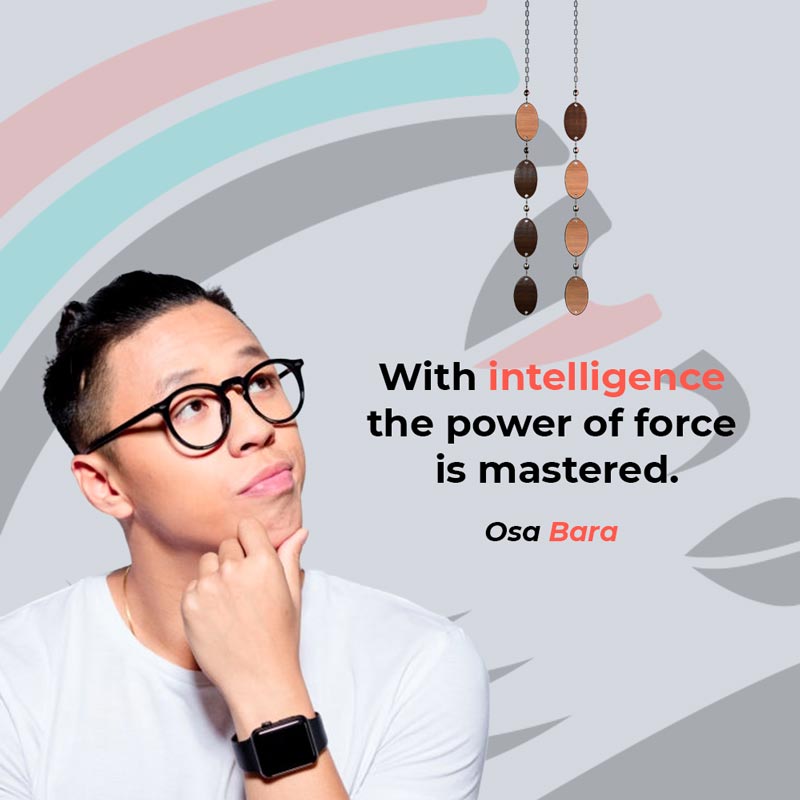
- The iron wanted to persist with the candle.
- The Sun rises for everyone, except for you.
- He who does good in abundance will receive it in abundance.
- The broken gourd will never fill up.
- The broken gourd will never be called justice.
- The father says: If you are not happy at home, it is better that you come with me.
- Good and evil threatened the Babalawo.
- In the land of the dead, I am a foreman.
- He who cried in the womb is blessed.
«The broken gourd will never be called justice» reflects on the perception and social valuation of what is considered imperfect or damaged. It suggests that those who have already been scarred by life, or who find themselves in disadvantaged situations, are often overlooked or dismissed by society, illustrating how prejudices and prior judgments can blind justice and equity.
Says Ifa Otura Niko:
In the Otura Niko sign, Ifá reveals to us a story woven of challenges and blessings, reflecting the complexities of life. He tells us of a household that once enjoyed economic abundance, but now faces scarcity, reminding us of the instability of fortune. Within this home, we find a person with health problems related to the womb and another who is expecting a child, who is destined to become a wise man, a Babalawo, who will bring light and wisdom to his environment.
Ifá emphasizes the importance of caring for and feeding the spirit of the father to attract good luck, emphasizing that our actions and omissions have a direct impact on our destiny. In addition, we are warned about daily care, such as avoiding dangerous habits and being aware of where and what we eat to avoid illnesses.
This sign also urges us to be cautious with our financial ambitions, reminding us that the accumulation of wealth does not guarantee happiness and can have an unexpected fate, such as being used for our own funerals.
Ifá says that we must be alert to negative influences and betrayals that could poison our path. The importance of respect and obedience towards elders is highlighted as the key to a full and happy life. Specific practices for protection and purification are mentioned, such as the prohibition of bathing in the river and the need to take care of our spirituality.
In the search for economic improvement, Otura Niko talks about how the support of guardian angels and faith in what many despise, such as lottery tickets not chosen by others, can be the path to fortune. This journey teaches us to respect the holy days and not to work when we feed the saints, recognizing their power in our lives.
This sign speaks of a dark-skinned woman with a red blanket, a harbinger of imminent prosperity symbolized by three large lots, as long as we make the correct offerings to Shango. Ifá advises us to be satisfied with what we have while we work and wait for what is to come, and reminds us of the importance of protecting our home and its energy, keeping negative influences at bay to preserve our Ashé.
When it comes out in an Ifa consultation or divination
When Otura Niko manifests itself in an Ifá consultation or divination, it implies a series of specific practices and offerings that the Awó must perform to align the energies and ensure the protection and favor of the orishas and ancestors. These practices include:
- Place a gourd containing an egg, honey and brandy behind the door of the Awó's house. This act symbolizes the protection, sweetness and purification of the home and life of the consultant. Honey softens relationships and interactions, while brandy, with its strength and volatility, serves to ward off negative energies.
- It is crucial to blow liquor into the okpele, a divinatory instrument of Ifá, and sprinkle a little liquor on the front door. This is done to cleanse the path of the Awó, ensuring that clarity and protection accompany it in its entrances and exits.
- Otura Niko demands quick and determined action: offer a goat to Eshu. Eshu, being the orisha of paths and communication, plays a crucial role in ensuring that messages and offerings are received by the orishas. The sacrifice of the goat is a significant gesture of respect and recognition towards Eshu, facilitating the opening of paths and the removal of obstacles.
- Furthermore, emphasis is placed on the importance of feeding the dead (Egun). This practice reflects respect and veneration for ancestors, recognizing their continued influence in the underworld. After making these offerings, everything is taken to the mountain in a basket and placed in a furnia, an act that symbolizes the return to the land and the cycle of life, death and rebirth.
Otura niko for women:
When Otura Niko is revealed in an Ifá consultation for a woman, the specific practices and advice focus on protecting and strengthening her spiritual connection, especially if she is pregnant, and on safeguarding her physical and emotional well-being.
To honor Oshún, Orisha of love, fertility and rivers, two Carmelite doves will be offered to you. This sacrifice is made in a way that connects deeply with femininity and motherhood; The doves are sacrificed on the woman's back, allowing the blood to flow down onto Oshún, placed on the ground. This offering seeks to invoke Oshún's blessing for protection, fertility and love in a woman's life, as well as strengthen her connection with divinity.
In the case of a pregnant woman who has Otura Niko revealed to her in a divination, she is urged to make additional sacrifices. These acts not only seek to ensure the health and well-being of the unborn child, but also to strengthen the spiritual bond between the mother, the child and the spiritual world, preparing a life path full of health, protection and blessings for the baby.
Additionally, Otura Ogbe brings crucial advice on fidelity and personal relationships. Women under this sign are warned against infidelity and are advised to avoid relationships with people who show aggressive tendencies or who possess weapons. This advice highlights the importance of personal and emotional safety, and recognizes the serious consequences that can arise from violent situations. The essence of this advice is to foster healthy and safe relationships that contribute positively to the well-being of the woman and the harmony of her environment.
It may interest you: Oddun of Ifa Otura Meji
Meaning of the Odu of Ifá Otura Niko
Otura Niko is an extension Odu in which the nervous system was born. In this Oddun, orunmila He resided in the land of Iyesá. The consumption of star apple, sapote, round fruits, octopus and squid is prohibited. Conditions associated with this Oddun include problems with the throat (tonsillopathy), spine, nervous system and blood pressure.
This Odu addresses issues of coexistence between races, suggesting that the person lives or interacts closely with people of a different race. Highlights the importance of receiving Oduduwa in the event of health problems. It reveals difficult family situations, such as the suicide of one family member or the education of another in a convent or boarding school.
Otura Niko talks about the boredom of life, describing how even before being born, the child already experiences crying and shows a natural gift. This Oddun advises bathing with canutillo, French macaw, red fig tree and Iworiyeyé, highlighting its connection with purification and natural healing.
It is known as the Odu of schoolchildren, referring to those who grow up in the company of other children or near educational institutions. He states that “wisdom is the most refined beauty that the Babalawo has,” highlighting the value of knowledge and learning.
In this Oddun, it is told how Orunmila was deceived, which underlines the vulnerability of even the wisest. Likewise, it introduces the notion that death, represented by Ikú, sometimes fears and respects the living, which gives the Awó great power. Finally, he explains how death transforms the human being into bone and shadow, emphasizing the mystery and transformation inherent in the cycle of life and death.
Features of this Odu:
The Otura Niko (Ogbe) sign is characterized by profound teachings on consciousness and spiritual and material transformation. Key aspects that define its essence are highlighted here:
- Consciousness and Loss: Otura Niko addresses the lack of awareness that can arise after experiencing significant loss. This reflection invites a spiritual awakening and finding understanding and growth in the midst of pain.
- Origin of Corn: This sign marks the birth of corn in the world, symbolizing provision, sustenance and the importance of agriculture in the connection between the divine and the earthly.
- Communication with the Beyond: Otura Niko introduces communication between the world of the living and that of the ancestors (Eggún) through Oniko, the messenger. This aspect underlines the function of the sign as a bridge between the earthly and the spiritual, highlighting the relevance of maintaining a harmonious relationship with one's ancestors.
- Fight against evil: This Oddun reveals the confrontation against evil forces, even in those considered people of light. Otura Niko is a call to the spiritual evolution of the Awó, emphasizing the importance of integrity and constant self-improvement to counteract negative influences.
- Preparation and Punctuality: The teaching of acting with premeditation and without delay is central to Otura Niko, reflecting the need for anticipation and diligence in all facets of life.
- Generosity and Responsibility: The children of this Oddun are called to be generous and responsible. Generosity as a path to prosperity, and responsibility as the foundation of personal and community integrity.
- Life, Death and Renewal: Otura Niko contemplates the duality of existence, represented by life and death. The introduction of the Oparaldó, a ritual to ward off the dead that disturb the living, symbolizes the constant renewal and eternal cycle of life.
Secrets of Otura Niko
The secrets of Otura Niko reveal deep practices and symbolism within the Ifá tradition, offering specific spiritual guides for those under this sign:
- Protection and Prosperity: For the Awó of Otura Niko, keeping a branch of star apple and specific offerings behind the door symbolizes safeguarding prosperity and attracting the protection of these deities.
- Feed the Spirit: Feeding the spirit of the father or spiritual guide with a white rooster is an act of veneration that reinforces the connection with the spiritual world, ensuring guidance and protection.
- Care of the Saints: The warning about the theft of sacred objects emphasizes the importance of safeguarding religious elements and devotion to deities.
- Protection Rituals: Placing a gourd with symbolic elements behind the door and using liquor in rituals are practices intended to cleanse, protect and open paths on both the physical and spiritual levels.
- Offerings and Purification: It emphasizes making offerings to the godfather's Ifá and purification through specific rituals, such as blowing liquor and performing ebbó, to maintain harmony and attract blessings.
- Lucky Attraction: The practice of placing foods with syrup to attract ants is associated with invoking luck and abundance, while the importance of not harming these beings is underlined.
- Restrictions and Warnings: It warns about the prohibition of visiting the river, consuming certain foods and tendencies towards vices, indicating the need for self-control and caution.
- Relationships and Loneliness: Otura Niko talks about loneliness as a condition of life for some people, but also highlights the importance of obedience and religious devotion as paths to a long and meaningful life.
- Special Days and Sacrifices: The prohibition of working on Thursdays and the need to make sacrifices and receive specific deities to strengthen personal and spiritual power are a fundamental part of this sign.
It may interest you: Sign of Ifa Irete Ansa
Ifa Otura Niko Oddun Prayer:
Otura Niko Oniko Lo Gba Abe Si Aiye Awó Ke Tanshe Afefe Lorun Adifafún Erun Ti O Nlo Sile Orishaokó.
Meaning: Otura the messenger, a messenger who will receive those who beg on earth. The fortune teller who understands the message with the wind takes it to Heaven what was prophesied by Ifá for the ants when they went to Orishaoko's house.
Ebbo by Otura Niko: For the Good to Come. (I'll go Umbo)
The Ebbo of Otura Niko "So That the Good Comes" (Iré Umbo) is a ritual designed to attract positive influences and blessings into the life of the practitioner, strengthening the connection with the spiritual world and ensuring the protection and favor of the deities and the ancestors. This ebbo is performed with a clear intention to invoke the Ire, the positive and auspicious energies that favor the individual in their endeavors and general well-being. Here the ritual process is detailed:
- Preparation of the Elements: You begin by collecting three bottles of brandy, a powerful element for purification and spiritual connection, recognized for its ability to cleanse negative energies and open paths.
- Use of the Husk: On a white plate, cascarilla, a sacred substance made from crushed eggshells, known for its protective and purifying properties, is spread. The white color of the plate and the shell symbolize the purity, peace and clarity that you wish to attract.
- Summoning Otura Niko: On this preparation, Otura Niko is atefá, that is, a divination session is carried out where this sign is invoked and prayed, focusing the energy of the ritual towards the manifestation of the requested blessings.
- Consecration of Brandy: The cascarilla powder prepared in the dish is placed in one of the brandy bottles. This consecrated bottle is intended for the dead (Egun), serving as an offering to appease and thank the ancestors, requesting their guidance and protection.
- Offerings to Orunmila and Eshú: The two remaining bottles, one for orunmila and another for Eshú (Elegbá), are offered without adding husk powder. Orunmila, as the deity of wisdom and divination, and Eshú, the orisha of paths and destiny, are invoked to ensure success and protection in all aspects of the practitioner's life.
Herbs (Ewe) of this Oddun are:
- Anacahuita.
- Do not forget me.
- Cainite.
- Higuereta.
- Gimp.
Patakies (Stories) of the sign Otura Niko (Otura Ogbe)
Yemaya's betrayal of Ogun
In the culture and tradition of Ifá, the patakíes (stories) of the sign Otura Niko (Otura Ogbe) offer moral, spiritual and philosophical lessons for those to whom this Odu was revealed.
Yemayá's betrayal of Ogún narrates how Yemayá, initially in an engagement with Obatalá, undertakes a mission to obtain sapotes as part of a deal. On his way, Eshu tries to sabotage his mission through traps, inspired by Ogún's hunting techniques. However, Ogún, aware of Eshu's machinations, intervenes to ensure Yemayá's success. As Yemayá advances collecting the fruits, Ogún and Eshu interact in a game of cunning, where Eshu is eventually distracted by Ogún, allowing Yemayá to complete his task.
Then, Yemayá and Ogún appear before Obatalá, who grants Yemayá lordship over the sea. Despite the blessing of their union by Olofin, it is noted that the marriage would face challenges due to the incompatible nature of both. Eventually, Yemayá gives in to temptation and cheats on Ogún with Sabano, an act discovered by Ogún's faithful dog. The dog, witness to the infidelity, guides Ogún to the place of adultery, resulting in a violent confrontation.
Explanation: The story reflects the complexities of relationships and the consequences of actions driven by deception and betrayal. It demonstrates how disloyalty not only breaks the harmony in relationships but also leads to destruction and chaos. Through the cunning of Ogún and the loyalty of the dog, the value of sagacity and fidelity in the face of adversity and betrayal is highlighted. Furthermore, it highlights the importance of truth and honesty in building strong and lasting relationships. The narrative warns of the repercussions of deception, showing that, although the truth may take time to come to light, dishonest actions are eventually discovered, leading to painful consequences for all involved.
The farmer and wealth
In Ire (Good Luck)
In a period of intense drought, a farmer goes to Orunmila in search of guidance. After a consultation in which Otura Niko is revealed, Orunmila prescribes an Ebbó with specific elements and the promise of a considerable investment (a lot of money). The farmer complies with the ritual, and shortly after, it begins to rain, marking the end of the drought. In an act of faith and hope, he decides to start working the land as soon as the rain stops. His work and faith are rewarded when, upon turning the earth, he discovers great wealth.
This story symbolizes faith in the spiritual process, the importance of patience and hard work, and how these elements, aligned with the right spiritual guidance, can lead to overcoming adversity and achieving abundance.
In Osogbo (Bad Luck)
On the other hand, when Otura Niko is seen in Osobo, he narrates the tragedy of a farmer on the verge of ruin due to a prolonged drought. Despite receiving a specific warning from his guardian angel along with the promise of good fortune, the farmer fails to completely obey the instructions given. Disobedience costs him dearly: although luck comes to him from heaven in the form of bags of money, death also comes to him, as the bags crush him for not having followed the warning not to work or get wet that day.
This patakí reflects the importance of obedience and humility in the face of divine warnings and advice. It dramatically illustrates how impatience and neglect of spiritual counsel can have fatal consequences, even when fortune seems within reach.
Both Patakís, through the experiences of the farmer, teach us about the duality of life, respect for spiritual norms, and how our actions and decisions directly influence our destiny. Otura Niko, as a sign of extremes and possibilities, reminds us that blessing and misfortune can be two sides of the same coin, and that our wisdom and respect for the sacred will determine which of these sides will guide us.
When Orunmila went to see Olodumare.
In this story, Orunmila faces a great challenge: the need to consult Olodumare to resolve a serious situation on Earth. However, the path to Olodumare is unknown to him, as is the enchantment needed to get there. In his search for solutions, Orunmila asks himself a question and discovers that he must make an Ebbó (offering) that includes a rooster, needles, colored threads, fabrics, a basket, colored ribbons, eggs and buns, among other elements. This Ebbó symbolizes preparation, generosity and the interconnection of all aspects of life.
After performing the Ebbó, Orunmila sets out on his way and meets Eshú, who appears disguised in torn clothes. The delivery of fabrics, needles and threads to Eshú not only represents an act of generosity but also the recognition of the importance of Eshú in the order of the universe and in the communication between the divine and the earthly. Eshú, grateful, guides Orunmila to Orishanla (another manifestation of Obatalá), to whom Orunmila offers ten eggs, marking another act of generosity and recognition.
Orishanla, happy with the eggs, a precious commodity at that time, reveals to Orunmila the path to Olodumare. When she arrives, Orunmila finds Olodumare's door closed, but she ingeniously manages to catch the attention of some boys through the bars of a window, offering them buns. The promise of sharing what she carried in her basket motivates the young people to open the door to her, allowing Orunmila to finally access Olodumare and seek her advice.
Moraleja
History teaches several important lessons:
- Generosity Opens Paths: Orunmila demonstrates that generosity and helping others, even when nothing is expected in return, can open paths and facilitate the achievement of important goals.
- The Importance of Eshú: Eshú, often seen as the orisha of communication and paths, plays a crucial role in Orunmila's direction and guidance, underscoring the importance of recognizing and respecting all the forces of the universe.
- The Wisdom of the Elders: Orishanla, representing wisdom and patience, is vital in guiding Orunmila on his path. This highlights the value of listening and learning from those who have more experience and knowledge.
- Problem Solving Requires Effort and Creativity: Orunmila demonstrates that, with ingenuity and willingness to share, obstacles that seem insurmountable can be overcome.
The story of Orunmila and his journey to see Olodumare is a powerful reminder that humility, generosity and wisdom are key to overcoming difficulties and achieving our highest goals.
Otura Niko (Otura Ogbe) Ifa Traditional Nigerian
Erin Ló ní n Moto Kíun Ní Minrin Ní Minrin Mó
Erin Mo Kí or NA
Aláwòo moduru moduru
Efòn Ló ní n mó kíun ní mòjò à arò ní mòjò àárò mó
Efòn mo kí or ná
Aláwòo mòdùrù mòdùrù
A day fún Onílé Akódì
Èyí tí ó tanná olà Sílè domo
Wón ní ó rbo
Òun le layé báyìí?
Wón ní kó ru ìyá odó méji
Kó wáá tan fìtílà kan si enu ònà òde
Kó tan òkan senu ònà èyìnkùlé
Kó fi òòrí so òkan
Kó fi epo tan òkan tú kù
Wón ni gégé è niré ó moo se
Onílé Akódì bá rbo
Ó tanná senu ònà
Ajé n wolé è
I will go gbogbo n wolé è
Òun náà.
Ó lÉrin lón ní n mó kiun ní mirin ní minrin mó
Erin Mo Kí or NA
Aláwòo moduru moduru
Efòn Ló ní n mó kíun ní mòjò à arò ní mòjò àárò mó
Efòn mo kí or ná
Aláwòo mòdùrù mòdùrù
A day fún Onílé Akódì
Èyí ti or tanná Olàá lè domo
Ebo n won ni or se
Onílé Akódì Gbébo nbè
Ó rubo
Ifá tàn fÓlú or
Èdú tàn fawò
Èyin ò mò pé iná rere lÒpè n tàn.
In Otura Niko, Ifá wishes that this person is well and prays for him. Ifá says that he must offer sacrifice to the ancestral deity of his clan so that he becomes rich. He must also light 2 lamps that will be made in a clay pot, one at the front and the other at the rear entrance. Good things will come into the house.
Erin Ló ní n Motor Kíun Minrin Minrin Mold
Erin Mo Kí or NA
Aláwòo moduru moduru
Efòn Ló ní n mó kíun ní mòjò à arò ní mòjò àárò mó
Efòn mo kí or ná
Aláwòo mòdùrù mòdùrù
They were the ones who consulted Onílé Akódì
The one who would light a lamp of wealth pending upon the arrival of a child
He was advised to offer sacrifice
He asked 'Will I finally be able to have wealth?'
They advised him to offer two crushed yams in a mortar as a sacrifice
He must light a lamp made in a clay pot at the front entrance
And another in the back entrance
He should use shea butter as an oil for a
And palm oil for the other
They assured him 'All good fortunes would match you'
Onílé Akódì performed the sacrifice
He lit the lamps at the entrances
Riches began to enter his home
All good things also entered into his house
He surprised exclaimed 'I'
He said: Erin ló ní n mó kíun ní minrin í minrin mó
Erin Mo Kí or NA
Aláwòo moduru moduru
Efòn Ló ní n mó kíun ní mòjò à arò ní mòjò àárò mó
Efòn mo kí or ná
Aláwòo mòdùrù mòdùrù
They were the ones who consulted Onílé Akódì
The one who would light a lamp of wealth pending upon the arrival of a child
He was advised to offer sacrifice
And he did it
Ifá lights lamps for victory
Èdu lights for those who enter the village at night
Don't you know that these victorious lamps illuminate Òpè?
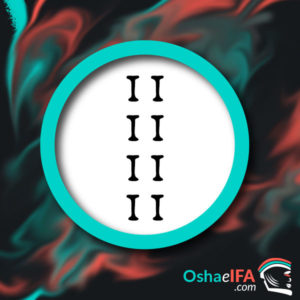
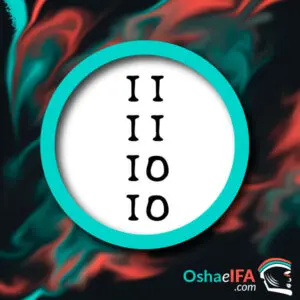

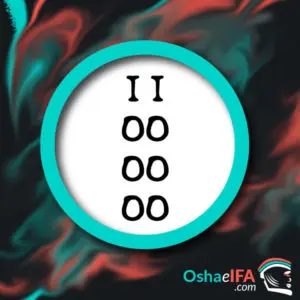

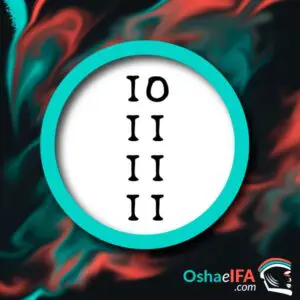
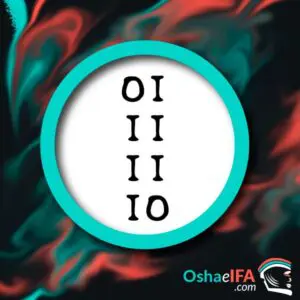
Very good advice